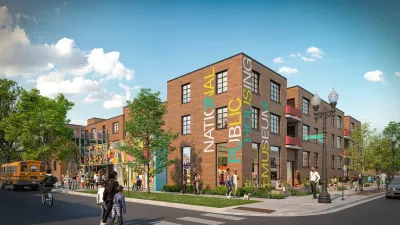Chicago is planning to join the list of cities monetizing their public spaces and facilities by selling ad space on city property. Past efforts by the city to launch so-called “municipal marketing” efforts have been beset by delays and missteps.
Alex Keefe reports that Mayor Rahm Emanuel's administration is rolling out a plan for "leasing dozens of billboards on city-owned property, selling advertising
space on downtown trash bins and finding a corporate sponsor for the
city's recycling program," as a painless way to earn the city $18 million towards closing a projected $298 million budget gap.
"We
live in an age where our taxpayers don't want to pay any more taxes,
[but] our citizens can't accept less services," said Chicago's chief
financial officer, Lois Scott, in an interview Friday with WBEZ. "So we
have to find a third way forward. And we found that third way forward by
tapping into an industry and a revenue stream that's out there already,
but it's not benefitting our taxpayers."
"City Hall's estimate that municipal marketing will be worth $18
million next year initially raised questions from some aldermen, after a
similar plan last year fell flat," notes Keefe. "We are a few months
delayed in where we expected to be," Scott said. "And I think that the
taxpayers and the citizens will agree that we've made the right decision
about how to do this."
"'We did not want a repeat of the bridge
houses,' she said, referring to an earlier deal that put Bank of America
ads on a pair of historic Chicago River bridge houses last year. The
deal drew in just a few thousand dollars for the city, but was reviled
by architecture critics who said it tarnished the downtown cityscape."
FULL STORY: Mayor wants to raise money by selling ad space on city property

Study: Maui’s Plan to Convert Vacation Rentals to Long-Term Housing Could Cause Nearly $1 Billion Economic Loss
The plan would reduce visitor accommodation by 25,% resulting in 1,900 jobs lost.

Alabama: Trump Terminates Settlements for Black Communities Harmed By Raw Sewage
Trump deemed the landmark civil rights agreement “illegal DEI and environmental justice policy.”

Why Should We Subsidize Public Transportation?
Many public transit agencies face financial stress due to rising costs, declining fare revenue, and declining subsidies. Transit advocates must provide a strong business case for increasing public transit funding.

Paris Bike Boom Leads to Steep Drop in Air Pollution
The French city’s air quality has improved dramatically in the past 20 years, coinciding with a growth in cycling.

Why Housing Costs More to Build in California Than in Texas
Hard costs like labor and materials combined with ‘soft’ costs such as permitting make building in the San Francisco Bay Area almost three times as costly as in Texas cities.

San Diego County Sees a Rise in Urban Coyotes
San Diego County experiences a rise in urban coyotes, as sightings become prevalent throughout its urban neighbourhoods and surrounding areas.
Urban Design for Planners 1: Software Tools
This six-course series explores essential urban design concepts using open source software and equips planners with the tools they need to participate fully in the urban design process.
Planning for Universal Design
Learn the tools for implementing Universal Design in planning regulations.
Smith Gee Studio
Alamo Area Metropolitan Planning Organization
City of Santa Clarita
Institute for Housing and Urban Development Studies (IHS)
City of Grandview
Harvard GSD Executive Education
Toledo-Lucas County Plan Commissions
Salt Lake City
NYU Wagner Graduate School of Public Service



























